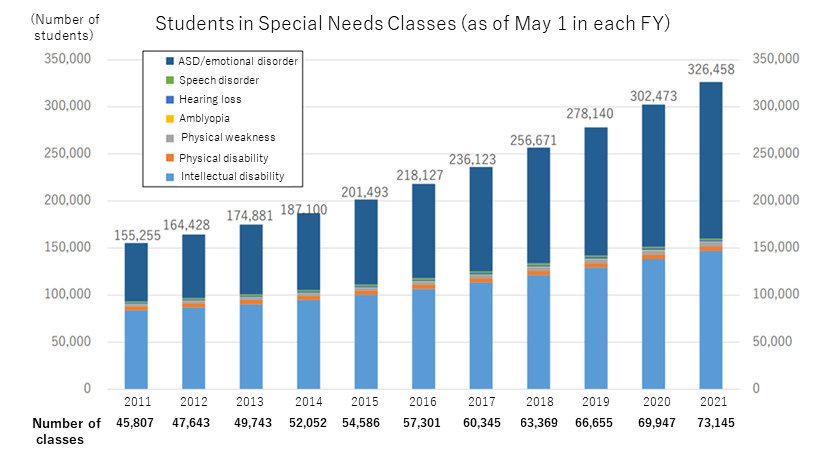The results of an assessment of the United Nations Convention of the Rights of Persons with Disabilities have been announced and more than several thousand views posted on SNS. Among the various opinions posted, some parents and the guardians of children with disabilities expressed their opposition, stating that "if children now attending special needs school are enrolled in regular school and classes without support, they will not be able to keep up with their peers and this will lead to bullying."
If I am not mistaken, this sort of opposing view is similar to that of members of the special committee that was introduced in my previous blog post, Inclusive Education = Without Support Schools, Children Will No Longer Have a Place, which is based on a mistaken understanding.
Inclusive education aims for an environment that coincides with educational services that appeal to and match the individual characteristics of local children, both those with or without disabilities, in regular classes. It is not a forceful act that throws children attending special needs school into regular classes. Inclusive education is not something that can be achieved overnight--it requires much time and money. Furthermore, rather than a temporary repair, the current educational system needs an extensive make-over that could even be called structural reform.
Why is the United Nations undertaking this reform that is so time-consuming and expensive? That is because humankind does not stop moving forward and that is the direction of social change. In the history of humankind, the path from despotism and slavery to equality, freedom and guaranteed human rights aims for a harmonious society that respects diversity and those with different views. This is a process taking place simultaneously in the world, and Japan is not a sole exception.
The United Nations also understands that there are differences in the rights and circumstances of disabled persons depending on the country and territory. Even if inclusive education cannot be instituted immediately, something can still be accomplished by moving steadily in that direction. However, even at the time of this second study, UN committee members had to issue a strong warning to stop segregated education. This was because after the ratification of the treaty, in Japan which had agreed to steadily institute inclusive education, there was instead a move toward expanded segregated education.
The chairperson of the Committee on the Rights of Persons with Disabilities used the word "regress," a term that refers to the situation in Japan where elementary, junior high, and senior high school students enrolled in special needs schools and classes continued to steadily increase even after ratification of the treaty (Fig. 1).
Soon after ratification of the treaty, the number of the schoolchildren enrolled in special needs schools began to increase. The fact that this trend has not stopped, but continues at present is not attributed to acceptance of inclusive education by UN committee members, but rather acknowledges the fact that segregated education is expanding. As indicated in the literal interpretation of the general education system by the Ministry for Foreign Affairs (See previous post ), Japan originally chose segregated education, not inclusive education, so there is no reason to be surprised at the current circumstances which are the expected result of this choice.

Source: Ministry of Education, Culture, Sports, Science and Technology (MEXT), Elementary and Secondary Education Bureau, Special Needs Education Division, "Enhancement of Special Needs Education"
https://www.mhlw.go.jp/content/000912090.pdf
At present, there are only two logical choices that Japan can make. In line with the recommendation of the United Nations committee, it can reform the divided education system or no longer remain a ratifying country of the treaty.
If promoting freedom and human rights is the path to be taken by all of humanity, Japan's choice requires no explanation, but it will be a solitary path in the world.



 Yoichi Sakakihara
Yoichi Sakakihara










